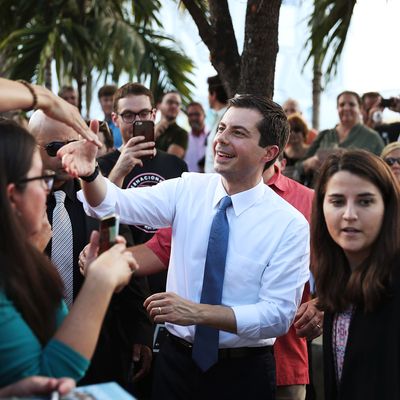
Political junkies tend to become familiar with obscure politicians who are potentially rising stars, particularly if they’re considered (or consider themselves) to be presidential timber. I knew about Sarah Palin as a darling of the anti-abortion movement before John McCain launched the little-known Alaskan hockey mom into global fame by placing her on his ticket in 2008. And I knew about a brilliant law professor and state senator from Illinois named Barack Obama before his 2004 Democratic-convention speech made him, to borrow a term from his future running mate, Joe Biden, a BFD.
But elite familiarity with such pols can make it easy to forget how few actual voters know about them. That’s a bad thing for said pols when it comes to raising money and registering support in life-giving public-opinion surveys. But it’s a very good thing when it comes to having room to grow support.
Back in February, FiveThirtyEight’s Nathaniel Rakich took a look at the 2020 presidential field by analyzing actual, as compared with potential, support among Democrats, and it wasn’t strictly a matter of the unknowns looming large as future dark horses. Biden, for example, was a very well-known candidate who was even more popular than you’d expect from name ID alone. At the other end of the spectrum was Michael Bloomberg, a reasonably well-known figure who was so unpopular that no amount of additional exposure was going to help him (he subsequently decided against running). By and large, though, most candidates already in the field at that point were about where you’d expect based on the limited familiarity voters had with them. For someone like Bernie Sanders, that meant pretty strong support but perhaps less potential growth.
Here’s a new take on name ID from Quinnipiac for the candidates currently considered viable:
The list above shows the views of registered voters from across the partisan spectrum, but they aren’t significantly different from those exhibited earlier by Democrats and Democratic-leaning independents. Unsurprisingly, everyone knows the president, and most people know Biden and Sanders. Also unsurprisingly, candidates who haven’t registered much support in horse-race polls, like Castro, Gabbard, Inslee, and Hickenlooper, aren’t well known.
Most interesting are the candidates in the middle, who have shown a pulse in horse-race polls but still aren’t that well known. In the same Quinnipiac poll, among Democrats and leaners, Kamala Harris is at 8 percent with obvious room to grow. Pete Buttigieg is at 5 percent with even more room to grow, since only about half of Democratic voters know him from the Who’s Pete Townshend.
It’s useful to look at some other recent candidates and how their support compared to their familiarity. At the beginning of 2007, Obama’s name ID was at 53 percent, though it jumped to 72 percent after he announced his presidential candidacy. As late as September 2015, Sanders was still unknown to 38 percent of Democratic voters but then went on to give Hillary Clinton a run for her money.
Most interesting, though, is the politician those 23 Democrats are competing to oppose. If Biden is someone very well-known and very popular, Donald Trump has always been very well-known and very unpopular. In July 2015, shortly after Trump announced for president, an
ABC–Washington Post survey showed only 6 percent of Americans did not know him well enough to express an opinion about him. His favorable-to-unfavorable ratio was 33 to 61. The new Quinnipiac poll from which the name ID of the Democrats was assessed shows only 2 percent of Americans failing to recognize their president. His favorable-to-unfavorable ratio —after the entire GOP has fallen into lockstep, worshipful support of the man — is up to only 38 to 57.
So what’s likely down the road? Will Biden lose some altitude in popularity because of the rigors of a tough presidential contest? Probably, but how much he loses will matter a great deal. Will at least one not-that-well-known Democrat emerge as a serious contender? Probably, though it’s unclear which candidate or candidates that might be. Will Trump, the most instantly identifiable pol in the country from the moment he became one, suddenly become popular? Probably not. The Beatles famously sang, “All you need is love.” Trump needs some good base-motivating hate, and a lot of luck.






























